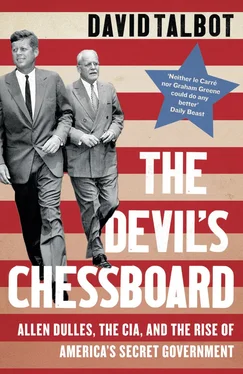Under the terms of Operation Sunrise, Wolff specifically agreed not to blow up the region’s many hydroelectric plants, which generated power from the water roaring down from the Alps. Most of these installations were owned by a multinational holding company called Italian Superpower Corporation. Incorporated in Delaware in 1928, Italian Superpower’s board was evenly divided between American and Italian utility executives, and by the following year the power company was swallowed by a bigger, J. P. Morgan–financed cartel. The ties between Italian Superpower and Dulles’s financial circle were reinforced when, toward the end of the war, the spymaster’s good friend—New York banker James Russell Forgan—took over as his OSS boss in London. Forgan was one of Italian Superpower’s directors.
Dulles concluded that Wolff was, in effect, a member of his international club—a man with similar views, connections, and willingness to do business. Neither man was particularly interested in the clash of ideas or human tragedies associated with the war. They were fixed on the calculus of power; each understood the other’s intense ambition. Operation Sunrise was for both of them a bold, high-wire career move.
After he decided that Wolff was a dependable partner, Dulles went to great lengths to rehabilitate the SS commander’s image. In his reports back to OSS headquarters, he framed Wolff in the best possible light: he was a “moderate”and “probably the most dynamic [German] personality in North Italy.” Although some U.S. and British intelligence officials suspected that Wolff was serving as an agent of Hitler and Himmler and trying to drive a wedge between the Allies, Dulles insisted that the German general was acting heroically and selflessly to bring peace to Italy and to spare its land, people, and art treasures from a final, scorched-earth conflagration.
Dulles knew from the beginning that working with Wolff was an extremely risky proposition—not just because of the Allies’ strict prohibition against a separate peace deal but because Himmler’s right-hand man was certain to be placed high on the list of Nazi war criminals. Even many years later, when the evidence against Wolff had grown to utterly damning proportions, the old spy refused to pass judgment on him. “ The conclusions[about Wolff] must be left to history,” wrote Dulles in his carefully calibrated Operation Sunrise memoir. He was delaying a judgment that, for many, had long since been obvious.
When Wolff was later confronted with the obscenity of the Nazi leadership’s war crimes, he would inevitably plead ignorance, claiming he occupied such a lofty perch in the Reich’s clouds that he did not learn about the death camps until the final days of the war. When this tactic failed, he would claim that he had been powerless to stop the mass slaughter, or he would fall back on legalisms and other technical evasions. But the stains on Wolff were not so easily erased.
Karl Wolff, who would go down in history as “ one of the unknown giantsof Hitler’s Reich,” was content to operate in the shadows. While little known by the public, however, he played a prominent administrative role in Hitler’s lethal assembly line. He was, as Time magazine later branded him, the “Bureaucrat of Death.”
The Nuremberg trials would firmly establish the principle that administrators of murder—not just the actual executioners—could be found guilty of war crimes. Although he was not a central cog in the daily operations of the Holocaust like Adolf Eichmann, Wolff, as Himmler’s top troubleshooter, frequently intervened to ensure the smooth efficiency of the extermination process.
During the Nuremberg trials, a highly incriminating letter writtenby Wolff would emerge that made it clear how important his intervention could be in keeping the trains rolling to the death camps. In July 1942, after the trains hauling Polish Jews to the Treblinka gas chambers were temporarily halted because of the German military’s demand for railcars, Wolff appealed to a Nazi transportation official for help. After the rail shortage was successfully resolved, Wolff sent off a heartfelt letter of thanks.
“I was especially pleased,” Wolff wrote the transportation minister in a chillingly bureaucratic note, “to receive the information that, for the last 14 days, a train has been leaving daily for Treblinka with 5,000 members of the chosen people, and that in this way we are in a position to carry out this population movement at an accelerated tempo.”
Wolff also played a key administrativerole in a series of medical experiments on human subjects at the notorious Dachau camp from 1942 through 1943. The research was conducted by Luftwaffe doctors who were intent on increasing the survival rates of German pilots, and was strongly supported by Himmler, who fancied himself a man of science. In the first round of experiments, human guinea pigs culled by the SS from Dachau’s ranks of the damned were forced inside special low-oxygen chambers to determine how long Luftwaffe pilots could fly at high altitudes before passing out. Inside the chambers, victims gasped for air, frantically cried out, and finally collapsed. It was up to the Luftwaffe doctor in charge of the experiments, a sadist named Siegmund Rascher, whether the victims would be revived in time or allowed to die. Rascher oversaw about 150 such high-altitude experiments, of which at least half resulted in death.
A subsequent round of medical experiments at Dachau was aimed at finding the best ways to revive German aviators who were rescued after crashing into the frigid North Sea. Camp inmates were forced to stand naked in freezing weather for up to fourteen hours. Others were submerged in tanks of iced water for three hours at a time. The subjects of the initial freezing experiments all died. But then the doctors added a new twist to their experiments. They “rewarmed” their victim in a hot bath and then revived him further with “animal heat” provided by four female Gypsies. The victim, after being nearly frozen to death, suddenly found his naked body warmly embraced by four women who brought him back to life.
Wolff should have been sitting in the dock at Nuremberg as part of the first round of defendants. But it was the cruder and less-connected executioner Ernst Kaltenbrunner who would hang for the sins of the SS. Nor was Wolff in the dock the following year, when the Doctors’ Trial began, though he would be singled out by prosecutors as one of the principal “masterminds” behind the Dachau experiments. Throughout the Nuremberg proceedings and the legal challenges that confronted him in later years, Wolff was watched over by his twin guardian angels—Dulles and Gero von Schulze-Gaevernitz. They made sure that the sword of justice never came down with its full might on SS-Obergruppenführer Karl Wolff. Among the few lives saved by the Operation Sunrise peace gambit, as it turned out, was that of Wolff himself and those of the SS officers who conspired with him.
On May 13, 1945, shortly after the Operation Sunrise surrender, Karl Wolff celebrated his forty-fifth birthday at the villa of the Dukes of Pistoia in Bolzano, the royal estate he had requisitioned as his final SS command post. Before his lunch party began, Wolff relaxed on thevilla’s terrace with his SS aide and Sunrise partner Eugen Dollmann, who had served as the interpreter for Hitler and Himmler in Italy. “It’s really rather pleasant here, Eugenio,” remarked the SS-Obergruppenführer, using his affectionate name for the Italy-besotted Dollmann as the two men gazed at Wolff’s children and Dollmann’s Alsatian hound gamboling in the rose garden. But Dollmann, who could hear American tanks rumbling nearby, could not let himself enjoy their idyll. “I have a feeling that this is going to be your last birthday in sunny Italy, Herr General,” he remarked. Dollmann’s grave mood brought a burst of laughter from Wolff. “My dear Eugenio! You’re not going to get the wind up in these lovely surroundings? And on my birthday too!”
Читать дальше











